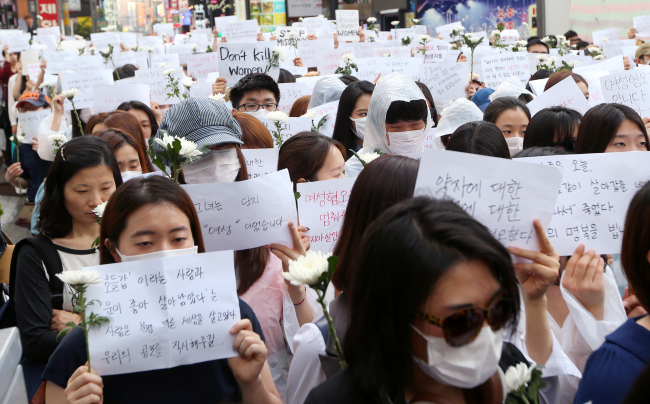The Normalisation of Anti-Feminist Sentiment in South Korean Culture

by Abbie Sharp
Misogyny in South Korea is a deep-rooted societal issue that extends through many of the experiences that South Korean women face in relationships, work, and life as a whole. This alone is not particularly noteworthy – many cultures around the world have the problem of culturally accepted and encouraged misogyny. However, the larger issue within South Korean culture is the prevalence and the acceptance of such ingrained misogyny in the first place. Entire prolific online communities exist for no other reason than to allow deeply misogynistic men to speak about their so-called ‘superiority’ over women; the most infamous community is a controversial far-right site known as Ilbe. The primary reason that this community has gone unchecked for so long is because of how accepted the oppression of women is – in fact, women’s voices and experiences are so often undermined to the point that any women speaking out about any issues they face because of misogyny are immediately seen by men as attacking men as a whole.
This culture of women being unable to speak out because of the dangers of how men react is an age-old problem that women have faced. However, more people began to realise what a widespread issue this was when the novel Kim Ji-Young, Born 1982, became a best-seller and quickly rose to prominence in South Korea. Upon its release, the novel immediately found itself under attack from self-proclaimed ‘anti-feminists’ who slated the novel for its so-called ‘feminist propaganda’ and ‘anti-male sentiment’. Kim Ji-Young, named after the most common Korean name for women during the 80’s, details the everyday misogyny that women in South Korea face from family, lovers, and strangers. The issues touched upon in the novel range from problems women face in motherhood and how they often need to end their careers to have children, the inherent expectation of motherhood and marriage as a ‘duty’ to family and country, and the sexual harassment and trauma that so many women face at the hands of complete strangers.
The public response to the novel also highlights the violence and vitriol that fuels such deep-rooted misogyny. After being reported to have mentioned that she was reading the novel to a female fan, one popular South Korean musician and celebrity received online hate from her male fans on the aforementioned Ilbe for close to a month, often accompanied by death threats and images of said fans burning pictures of her. This is despite the novel being based in absolute fact; for instance, South Korea has one of the worst gender pay gaps, with women earning only 63% of what men earn. Similarly, South Korea ranked a disappointing 108 in the Global Gender Gap Report in 2020, cementing its place as one of the lowest performing OECD countries.
Similarly, the impact Kim Ji-Young had on South Korean feminist activism was not isolated. The release of the novel in 2016 came just months after a young woman was stabbed to death in a public toilet in one of the most popular neighbourhoods in Seoul by a man she had never met before. The murderer, a 34-year-old man, immediately told police and later testified in court that he had committed the murder willingly, and that he had done it because of his hatred of women and how they ‘ignored and belittled’ him throughout his life. Despite the perpetrator himself acknowledging his violent misogyny several times throughout the case, the police stated that the murder was due to his mental state, citing numerous hospitalisations throughout his lifetime. Due to the murder being classified as a result of mental illness and not a violent hate crime against women, he received only thirty years in jail.
In response, protests arose because of how the case was handled; crowds of women gathered outside of subway stations across the country, leaving chrysanthemums and post-it notes mourning the death of the victim and denouncing the misogyny ingrained throughout South Korean society that allowed the crime to occur with such insignificant punishment. In response, small but loud groups of men interrupted the protests with signs vilifying feminists and stating that oppression against men should also be protested. In one occasion, a man dressed in a Zootopia costume with a sign reading ‘It's not that carnivores are bad, it's that animals that commit crimes’ but fled when he was confronted by female protesters. The response from women was because his pink elephant suit was a nod to the Ilbe community, and his sign existed only to take accountability away from men. This man also gained notoriety globally, with the director of Zootopia taking to Twitter to publicly denounce the man’s actions and association with the film. However, many men still openly disagreed with the protests, and argued that women were ‘misandric’ for not also protesting against issues like the mandatory military service for men.
Still, although anti-feminist sentiment and misogyny within Korean society are stilll widespread, things are slowly but surely changing, and the bravery of those who participated in the Post-It Note protests are an evergreen example of this. Similarly, while Kim Ji-Young, Born 1982 was a cultural phenomenon that helped so many people uncover and understand the issues with misogyny that exist in South Korea, what the novel represented was simply a stepping stone into helping South Korean women find a voice and realise that somebody out there understood. Likewise, the cultural landmarks that continue to help acceptance for the feminist movement are sure to carry on - until feminist movements in South Korea are accepted, until South Korean men are unable to escape accountability for their actions against women, and until Korean women are free to live as men do.
Study Abroad Columnist: Abbie Sharp, 3rd Year BA English Literature Undergraduate. Currently studying abroad at Seoul National University, Seoul.
